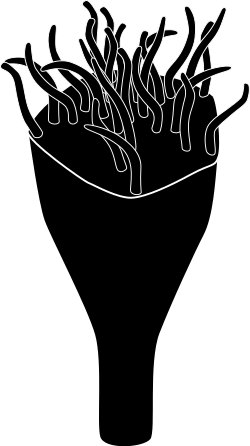Biology:Lepidocystis
From HandWiki
Short description: Extinct genus of echinoderms
| Lepidocystis | |
|---|---|

| |
| The lepidocystid Kinzercystis closely resembles Lepidocystis. | |
| Scientific classification | |
| Domain: | Eukaryota |
| Kingdom: | Animalia |
| Phylum: | Echinodermata |
| Class: | †Eocrinoidea |
| Grade: | †Lepidocystoids |
| Genus: | †Lepidocystis |
Lepidocystis is a Palaeozoic genus of imbricate lepidocystoid eocrinoid, closely related to Kinzercystis,[1][2] It bore a stalk, with which it attached to firm substrates;[3] and brachioles arising as lateral branches from its arms.[4]
It is only known from the late Botomian = Cambrian Series 2 Kinzers Formation.[5]
References
- ↑ Paul, C. R. C.; Smith, A. B. (1984). "The Early Radiation and Phylogeny of Echinoderms". Biological Reviews 59 (4): 443–481. doi:10.1111/j.1469-185x.1984.tb00411.x.
- ↑ Smith, Andrew B.; Zamora, Samuel (2013). "Cambrian spiral-plated echinoderms from Gondwana reveal the earliest pentaradial body plan". Proceedings of the Royal Society B: Biological Sciences 280 (1765). doi:10.1098/rspb.2013.1197. PMID 23804624.
- ↑ Zamora, Samuel; Deline, Bradley; Javier Álvaro, J.; Rahman, Imran A. (2017). "The Cambrian Substrate Revolution and the early evolution of attachment in suspension-feeding echinoderms". Earth-Science Reviews 171: 478–491. doi:10.1016/j.earscirev.2017.06.018. Bibcode: 2017ESRv..171..478Z. https://doi.org/10.1016/j.earscirev.2017.06.018.
- ↑ Paul, C. R. C.; Smith, A. B. (1984). "The Early Radiation and Phylogeny of Echinoderms". Biological Reviews 59 (4): 443–481. doi:10.1111/j.1469-185X.1984.tb00411.x.
- ↑ Nohejlová, Martina; Nardin, Elise; Fatka, Oldřich; Kašička, Libor; Szabad, Michal (2019). "Morphology, palaeoecology and phylogenetic interpretation of the Cambrian echinoderm Vyscystis (Barrandian area, Czech Republic)". Journal of Systematic Palaeontology 17 (19): 1619–1634. doi:10.1080/14772019.2018.1541485.
Wikidata ☰ Q120395525 entry
 |

